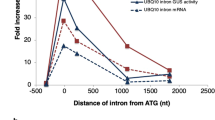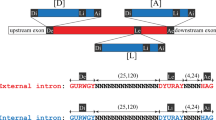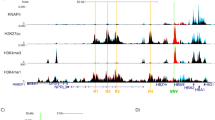Abstract
Many eukaryotic genes contain intervening sequences (IVS)1,2, but the rationale for their existence remains a mystery. Previous studies done in our laboratory demonstrated that the intron in a yeast tRNATyr gene, SUP6, does have a function3,4. We used the same approach to determine the role of introns in nuclear genes encoding messenger RNAs. A single actin gene with one intron exists in Saccharomyces cerevisiae5,6. The level of actin in yeast appears to be crucial to viability: either too much or too little actin inhibits growth7. Therefore, small effects on synthesis of actin protein resulting from the removal of the actin gene intron would be expected to cause measurable changes in cell growth. In the present study, an intron-deleted actin gene was constructed in vitro and was used to replace the single resident actin gene in a haploid strain. Analysis of the cells carrying the intron-deleted actin gene shows that the intervening sequence is not essential for actin gene expression.
This is a preview of subscription content, access via your institution
Access options
Subscribe to this journal
Receive 51 print issues and online access
$199.00 per year
only $3.90 per issue
Buy this article
- Purchase on Springer Link
- Instant access to full article PDF
Prices may be subject to local taxes which are calculated during checkout
Similar content being viewed by others
References
Abelson, J. A. Rev. Biochem. 48, 1035–1069 (1979).
Breathnach, R. & Chambon, P. A. Rev. Biochem. 50, 349–383 (1981).
Wallace, R. B. et al. Science 209, 1396–1400 (1980).
Johnson, P. F. & Abelson, J. Nature 302, 681–687 (1983).
Gallwitz, D. & Sures, I. Proc. natn. Acad. Sci. U.S.A. 77, 2546–2550 (1980).
Ng, R. & Abelson, J. Proc. natn. Acad. Sci. U.S.A. 77, 3912–3916 (1980).
Shortle, D., Haber, J. & Botstein, D. Science 217, 371–373 (1982).
Larson, G. P., Itakura, K., Ito, H. & Rossi, J. Gene 22, 31–39 (1983).
Rothstein, R. Meth. Enzym. 101, 202–211 (1983).
Jacq, C. et al. Mitochondrial Genes (eds Slonimski, P. et al.) 155–183 (Cold Spring Harbor Laboratory, New York, 1982).
Gallwitz, D., Perrin, F. & Seidel, R. Nucleic Acids Res. 9, 6339–6350 (1981).
Gallwitz, D., Donath, C. & Sander, C. Nature 306, 704–707 (1983).
McMaster, G. K. & Carmichael, G. G. Proc. natn. Acad. Sci. U.S.A. 74, 4835–4838 (1977).
Thomas, P. S. Proc. natn. Acad. Sci. U.S.A. 77, 5201–5205 (1980).
Author information
Authors and Affiliations
Rights and permissions
About this article
Cite this article
Ng, R., Domdey, H., Larson, G. et al. A test for intron function in the yeast actin gene. Nature 314, 183–184 (1985). https://doi.org/10.1038/314183a0
Received:
Accepted:
Issue Date:
DOI: https://doi.org/10.1038/314183a0
This article is cited by
-
Excised linear introns regulate growth in yeast
Nature (2019)
-
The intron of the yeast actin gene contains the promoter for an antisense RNA
Current Genetics (1990)
Comments
By submitting a comment you agree to abide by our Terms and Community Guidelines. If you find something abusive or that does not comply with our terms or guidelines please flag it as inappropriate.



